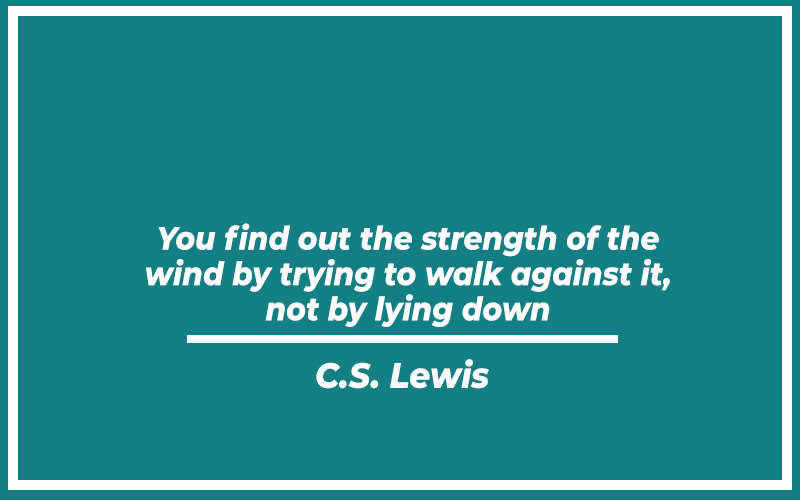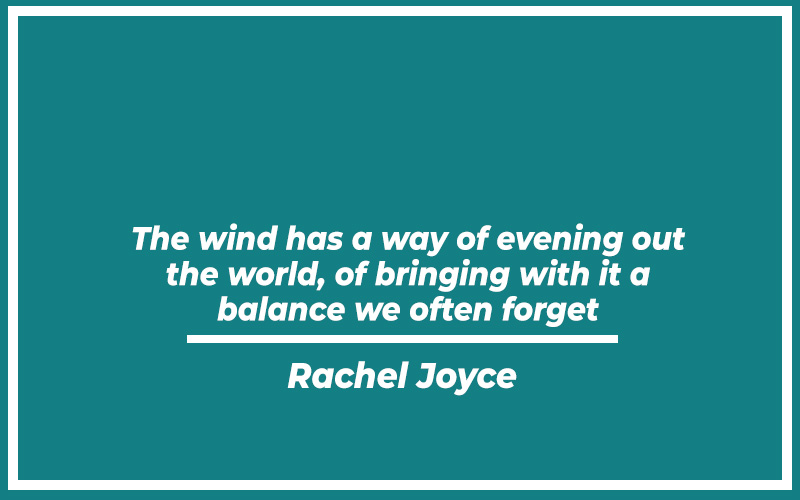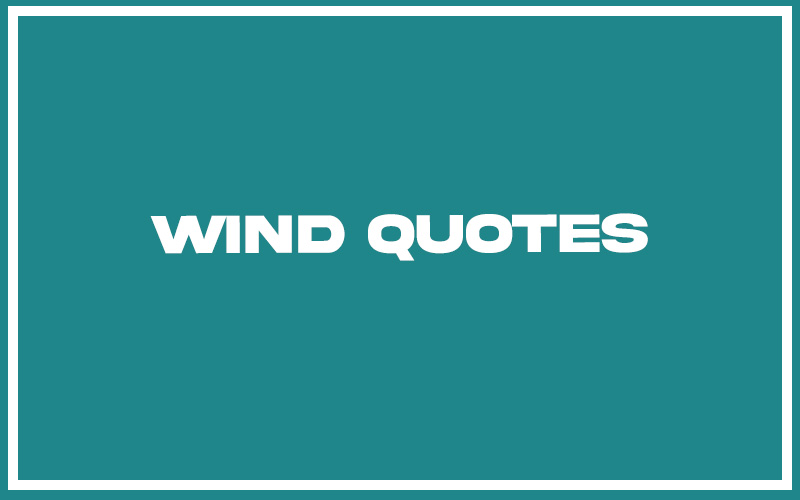Have you ever stopped to feel the wind as it brushes against your face or whistles through the trees?
Wind is one of those natural phenomena that can be both exhilarating and calming, depending on its mood. It carries with it the stories of distant places and brings changes in weather, signaling new beginnings or the end of a season.
As you think about wind, consider its power and the way it connects us all, moving across the world without boundaries or limits.
Best Wind Quotes

“You find out the strength of the wind by trying to walk against it, not by lying down.” – C.S. Lewis
C.S. Lewis’s quote uses the wind as a metaphor for adversity. He suggests that the true measure of a challenge—and our own strength—is realized when we attempt to confront it directly.
The imagery of walking against the wind represents the active effort required to overcome difficulties, emphasizing that passivity does not lead to growth or discovery of one’s capabilities. It’s a call to action, urging us to face our struggles head-on to understand and harness our full potential.
“The wind shows us how close to the edge we are.” – Joan Didion
Joan Didion’s reflective observation highlights the wind’s ability to signify our vulnerabilities and limits. The wind, in this metaphor, represents the unseen forces that can sway us, revealing how precarious our positions might be.
Didion’s quote is a contemplative reminder of our existential condition, nudging us to acknowledge our circumstances and the fine lines we navigate in life. It encourages an awareness of the external factors that influence us, often pushing us to confront the realities we might otherwise ignore.
“When the wind of change blows, some build walls, others build windmills.” – Chinese Proverb
This Chinese proverb contrasts two reactions to change: resistance and innovation. The wind of change, a powerful and inevitable force, can either prompt defensive barriers or creative solutions.
The proverb encourages embracing change constructively, suggesting that adaptability and innovation are more beneficial responses than resistance. It serves as a motivational thought for personal and societal adaptation, promoting a proactive and positive approach to the inevitable shifts and turns of life.
“The answer, my friend, is blowin’ in the wind.” – Bob Dylan
Bob Dylan’s famous lyric from “Blowin’ in the Wind” captures the essence of seeking answers in a tumultuous and ever-changing environment. The wind symbolizes the transient, elusive nature of truth and understanding.
Dylan suggests that solutions to our questions are not held in fixed places but are carried on the currents of time and change, accessible through observation and reflection. The quote invites us to consider that answers to life’s big questions might already be around us, caught in the flow of everyday life.
“If you want to see the sunshine, you have to weather the storm.” – Frank Lane
Frank Lane’s metaphorical advice links enduring hardship to achieving positive outcomes. The storm represents life’s challenges, and the wind within it, the tumultuous forces we must withstand. Lane emphasizes that perseverance through difficult times is necessary to reach brighter moments.
This quote inspires resilience and optimism, reminding us that hardships are often pathways to better days, urging patience and steadfastness in the face of adversity.
“A great wind is blowing, and that gives you either imagination or a headache.” – Catherine the Great
Catherine the Great humorously notes that the same wind can affect people differently, either sparking creativity or causing discomfort. This metaphor speaks to the subjective experience of change and challenge, highlighting how personal dispositions can influence our responses to external forces.
The quote invites reflection on our attitudes towards change—whether we see it as an opportunity for growth and innovation or as a source of stress and resistance.
“Kites rise highest against the wind, not with it.” – Winston Churchill
Winston Churchill uses the kite as a metaphor to illustrate that adversity can propel us to greater heights. The wind, often seen as a hindrance, is necessary for the kite to soar. This quote underscores the value of challenges in fostering strength, resilience, and progress.
Churchill’s words encourage a reassessment of difficult situations, suggesting that obstacles can be catalysts for achievement and elevation, urging us to leverage the adversities we face to ascend to our fullest potential.
“The winds of grace are always blowing, but you have to raise the sail.” – Ramakrishna
Ramakrishna’s metaphorical statement about the winds of grace suggests that opportunities and blessings are constantly present, but it is up to us to seize them. The imagery of raising a sail to catch the wind encapsulates the proactive attitude required to benefit from these offerings.
This quote encourages us to be vigilant and prepared, ready to act when chances arise. It reminds us that while the universe might provide, it is our responsibility to engage with these possibilities actively to move forward in life.
“I hear the howling of the wind that brings the long drear storm on its heavy wings.” – William Cullen Bryant
William Cullen Bryant captures the foreboding power of the wind in this vivid depiction. The howling wind is personified as a harbinger of storm, carrying weight and anticipation of change.
This quote evokes the emotional and physical responses elicited by nature’s signals, reminding us of the wind’s role as both a literal and metaphorical force that precedes transformation. It inspires reflection on how we interpret and react to the precursors of significant shifts in our lives and the natural world.
“If the wind will not serve, take to the oars.” – Latin Proverb
This Latin proverb emphasizes self-reliance and the determination to persevere when conditions are not favorable. By advising us to take to the oars when the wind fails, the quote suggests that we should not passively wait for external circumstances to aid us but instead take action to achieve our goals.
It’s a call to adaptability and resilience, urging us to find alternative paths to success when the first plan does not pan out.
“Winds and waves are always on the side of the ablest navigators.” – Edward Gibbon
Edward Gibbon highlights the skill and mastery required to harness the natural elements for one’s advantage. This quote suggests that the most successful navigators, or individuals, are those who can effectively utilize challenging conditions to their benefit. It serves as a metaphor for life, where the ability to navigate complex situations determines success.
Gibbon’s words encourage the development of skills and wisdom necessary to turn potential adversities into advantages.
“One can’t predict the wind but can adjust the sails.” – Indian Proverb
This Indian proverb teaches the lesson of flexibility and adaptability in the face of unpredictability. Just as sailors adjust their sails to accommodate the changing wind, we must alter our strategies and approaches based on the circumstances we encounter.
The quote promotes a proactive mindset, advocating for responsiveness rather than passivity, encouraging us to remain agile and prepared to make necessary changes for continued progress.
“The wind does not break a tree that bends.” – Sukuma Proverb
This Sukuma proverb from Tanzania uses the flexibility of a tree as a metaphor for resilience and adaptability. It teaches that strength does not always reside in rigidity; often, the ability to bend and sway with the wind’s pressure prevents breakage. T
he proverb is a powerful reminder of the value of flexibility in the face of adversity and challenges, suggesting that yielding at the right moment can be an effective strategy for survival and endurance.
“The strongest of all warriors are these two — Time and Patience.” – Leo Tolstoy
Leo Tolstoy’s quote, though not directly about wind, connects deeply with the themes often associated with it, such as endurance and the passage of time. Tolstoy posits that time and patience are the most formidable warriors, implying that enduring challenges and the steady passage of time can overcome any obstacle.
This perspective encourages a long-term view of life’s struggles, suggesting that persistence and the ability to wait are crucial components of success and overcoming adversity.
“The wind of heaven is that which blows between a horse’s ears.” – Arabian Proverb
This Arabian proverb celebrates the joy and freedom found in horse riding, suggesting that the best kind of wind is experienced in this exhilarating context. It poetically captures the essence of being in tune with nature and the sublime feeling of speed and motion, implying that some of life’s finest moments are felt amidst simple, natural pleasures.
The quote encourages us to find and savor these pure moments of bliss where we feel closest to the elemental forces of the earth.
“He who observes the wind will not sow, and he who regards the clouds will not reap.” – Ecclesiastes 11:4
This quote from Ecclesiastes warns against allowing uncertainty and fear to prevent action. It suggests that if one is overly cautious or perpetually waiting for the perfect conditions, they may never accomplish anything.
The metaphor of a farmer who fails to plant or harvest because he’s worried about the weather conditions speaks to broader life choices—encouraging boldness and decisive action despite the unknowns. It advocates for taking risks and moving forward even when conditions are not ideal.
“Forget not that the earth delights to feel your bare feet and the winds long to play with your hair.” – Khalil Gibran
Khalil Gibran’s quote evokes a deep connection with nature, emphasizing the earth’s pleasure in human touch and the wind’s playful interaction with us. It serves as a reminder of our intrinsic relationship with the natural world and encourages a return to simplicity and organic experiences.
Gibran’s poetic words inspire us to engage more fully with the environment, suggesting that such interactions are not only enjoyable but also fundamentally important to our sense of belonging and joy in the world.
“Wind is to us what money is to life on shore.” – Sterling Hayden
Sterling Hayden draws an intriguing comparison between wind and money, highlighting the wind’s essential role in the life of a sailor. For those at sea, wind drives movement and progress, much as money facilitates endeavors and opportunities on land.
This quote underscores the relative value of elements or resources, depending on one’s circumstances and environment. It invites reflection on what drives us in our various pursuits and how our values shift based on our needs and surroundings.
“If you want to see the sunshine, you have to weather the storm.” – Frank Lane
Frank Lane’s metaphor about enduring difficult times to reach brighter days resonates deeply in a discussion about perseverance. The storm here represents life’s challenges, and the wind within it, the tumultuous forces we must endure.
This quote encourages resilience and optimism, reminding us that hardships are often pathways to better times. It encourages patience and steadfastness in the face of adversity, urging us to maintain hope and keep pushing forward through difficult periods.
“When everything seems like an uphill struggle, just think of the view from the top.” – Unknown
This inspirational saying uses the metaphor of climbing against challenging winds to encourage perseverance. It suggests that the difficulties faced on the ascent are worthwhile for the reward that awaits at the summit.
This perspective is useful when dealing with any challenging endeavor where the path forward feels daunting. The quote motivates us to focus on the eventual benefits and achievements that result from enduring hard work and challenges.
“Be like the wind and drive others without being seen.” – Lao Tzu
Lao Tzu’s advice emphasizes the influential power of subtlety and indirect leadership. By comparing effective influence to the wind, which propels and affects change invisibly, this quote suggests that the most impactful leaders are those who inspire and direct without overt control or visibility.
It champions a leadership style that is empowering and supportive, rather than authoritarian, encouraging us to guide others gently towards growth and success.
“The winds and the waves are always on the side of the ablest navigators.” – Edward Gibbon
Edward Gibbon’s quote praises the skill of adept navigators who use natural forces to their advantage. This metaphor extends beyond sailing, suggesting that in life, just as in navigation, the most capable individuals can harness challenging circumstances to propel themselves forward.
It’s a reminder that challenges like the wind and waves can be advantageous if approached with expertise and resilience, turning potential obstacles into opportunities for progress.
“Let your dreams be bigger than your fears and your actions louder than your words.” – Christine Caine
Christine Caine’s quote, while not explicitly about wind, uses the metaphor of being vocal and active as a force that can drive change, much like a strong wind propels. It emphasizes the importance of ambition and visible effort over passive concern or silent intentions.
This sentiment encourages overcoming fear through the pursuit of substantial dreams and making impactful actions that speak volumes, inspiring others and effecting real change.
“Wind teaches us to endure, to stand tough even though the forces may want to carry us away.” – Unknown
This reflective statement acknowledges the wind as a symbol of endurance. It illustrates how enduring strong winds can teach resilience, reminding us to remain steadfast in our principles and goals even when external pressures are strong.
The quote is a metaphor for life’s trials, encouraging a steady stance in the face of adversity, and reinforcing the virtue of persistence.
“If you reveal your secrets to the wind, you should not blame the wind for revealing them to the trees.” – Khalil Gibran
Khalil Gibran’s poetic warning about discretion uses the wind as a metaphor for the spread of information. This quote beautifully illustrates the uncontrollable nature of words once spoken and the importance of cautious communication.
It encourages mindfulness in sharing personal or sensitive information, suggesting that once released, our words can travel far beyond our intended audience, much like the wind.

“The wind has a way of evening out the world, of bringing with it a balance we often forget.” – Rachel Joyce
Rachel Joyce’s perspective on wind introduces it as a force of nature that restores balance and perspective to our lives.
This quote suggests that the wind’s movements, whether gentle or tumultuous, remind us of the natural cycles of calm and storm, encouraging us to accept fluctuating circumstances as part of a larger equilibrium. It’s a call to embrace life’s ups and downs with grace and understanding.
“To hear never-heard sounds, To see never-seen colors and shapes, To try to understand the imperceptible Power pervading the world; To fly and find pure ethereal substances That are not of matter But of that invisible soul pervading reality. To hear another soul And to whisper to another soul; To be a lantern in the darkness Or an umbrella in a stormy day; To feel much more than know. To be the eyes of an eagle, slope of a mountain; To be a wave understanding the influence of the moon; To be a tree and read the memory of the leaves; To be an insignificant pedestrian on the streets Of crazy cities watching, watching, and watching. To be a smile on the face of a woman And shine in her memory As a moment saved without planning.” – Dejan Stojanovic
Dejan Stojanovic’s poetic exploration captures the essence of the wind’s inspirational power, presenting it as a metaphor for profound connection and understanding of the world.
This extensive quote reflects on the limitless possibilities of perception, imagination, and emotional resonance inspired by engaging deeply with the natural and human world. It encourages an expansive, soulful approach to life, where being in tune with nature’s and humanity’s subtleties can enrich and transform our understanding of reality.
Final Thoughts
Wind quotes often reflect on the wind’s invisible strength and its ability to inspire change and introspection. As you read these quotes, let them remind you of the wind’s enduring presence in our lives, shaping environments and influencing moments.
The wind teaches you to move with purpose but also to sway gracefully with the changes it brings. Whether it’s a gentle breeze or a powerful gust, remember that, like the wind, you have the ability to make waves and whisper to the souls of others.

